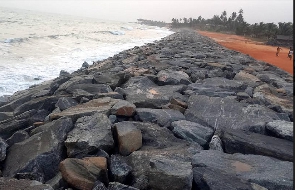Statistics have it that about 80% of the world's current beaches will disappear by the end of the 21st century. Yet, it is also estimated that about 80% of most coastal countries' tourism offers depend on beach tourism. That being the case, what will become of Ghana's beaches by 2100?
Ghana, known for its breathtaking 550-kilometer coastline, is facing a perilous threat to one of its most attractive tourist destinations —the beautiful sandy beaches – even before most of it is developed.
Coastal erosion, exacerbated by climate change causing rising sea levels, is rapidly consuming this pristine resource, prompting the implementation of grey infrastructure projects along the coast from Aflao to Half Assini. This defensive approach, involving sea defence walls, groins, and revetments, aims to protect the coastline but raises concerns about the future of beach tourism, which constitutes a significant part of Ghana's tourism offer.
A coastline under threat:
Ghana’s coastline has been under serious threats from a set of environmental causes since the turn of the 20th century. This has necessitated the rolling out the sea defence projects along the entire coastline by successive governments since pre-colonial times till date. Some were completed, others have reached some phases of completion and the rest are on the drawing boards.
Below are some of the key coastal defence works and protection undertaken in Ghana so far:
Keta Sea Defence Project
Ada Sea Defence Project
Sakumono Sea Defence Project
Atorkor-Dzita- Anyanui Sea Defence Project
Ngyiresia Coastal Protection Project
Aboadze Coastal Works
Nkontompo Coastal Works
Blekusu Coastal Protection works
Dansoman Coastal Protection Project
Mensah Guinea Sea Defence Project
La-Chorkor Sea Defence Project
Amanful-Kuma Sea Defence Project
New Takoradi Sea Defence Project
Axim Sea Defence Project
Anomabo Sea Defence Project
Ningo- Prampram Sea Defence Project
Dixcove Sea Defence Project
Komenda Sea Defence Project
Elmina Sea Defence Project
Cape-Coast Sea Defence Project
With over 20 sea defence projects, it is evident that successive governments recognize the urgency of addressing coastal erosion. However, the aggressive nature of this infrastructure, often replacing sandy shores with rocks and borders, highlights the severity of the situation. The very essence of what draws tourists to Ghana's beaches—soft sand, pristine waves, and picturesque coastal landscapes—is under great threat.
Impacts on tourism:
Beach tourism, a significant contributor to Ghana's tourism sector, is at risk of losing its allure, as the battle against coastal erosion intensifies. The idyllic scenes that once attracted sun, sand, surf seekers, and seawater enthusiasts are gradually being replaced by hardened barriers - rocks and boulders. The question arises: how will this transformation affect tourism going forward?
Aesthetic loss And deterioration:
The natural beauty of sandy beaches, a key element of beach tourism, is diminishing as concrete sea defence walls and rocky infrastructures take their place. The visual appeal that once lured travelers may be compromised, impacting the overall tourism experience. The beach is being lost and the coastal resources are deteriorated.
Recreational limitations:
Traditional beach activities such as sunbathing in the sand, and beach games such as beach soccer, volleyball, badminton, and sandcastle building may be constrained by the presence of rigid sea defence structures. The shift from sandy expanses to fortified rocky barriers could deter tourists seeking the classic beach experience. This would significantly limit recreational activities on the beach and greatly affect the tourism offer. How can this impact be mitigated?
Ecotourism concerns:
Ghana's coastal ecosystems such as mangroves, salt flats, etc. are vital for biodiversity conservation and support unique marine life. The installation of grey infrastructure may disrupt these ecosystems, affecting marine habitats and potentially deterring eco-tourists who value pristine natural environments instead of built ones.
Economic ramifications:
With beach tourism constituting a significant portion of Ghana's tourism revenue, the decline in the appeal of eroded beaches may result in economic setbacks for local businesses, tour operators, and communities dependent on tourism-related income in coastal areas.
The path forward:
As Ghana grapples with the dual challenge of coastal erosion and preserving its tourism appeal, a balanced approach is crucial. While grey infrastructure is necessary to safeguard against the immediate threats, sustainable alternatives and nature-based solutions should be explored to mitigate the impact.
Integrating environmentally friendly measures, such as planting beach vegetation, promoting dune restoration, and implementing soft engineering solutions such as beach nourishment through reclamations, can help maintain the natural charm of the beaches and even enhance them.
Striking a balance between protecting the coastline and preserving the natural allure of the beaches is imperative. The nation stands at a critical juncture, where thoughtful decisions and sustainable practices can safeguard its tourism legacy for generations to come.
Opinions of Tuesday, 9 January 2024
Columnist: Joel Degue



















